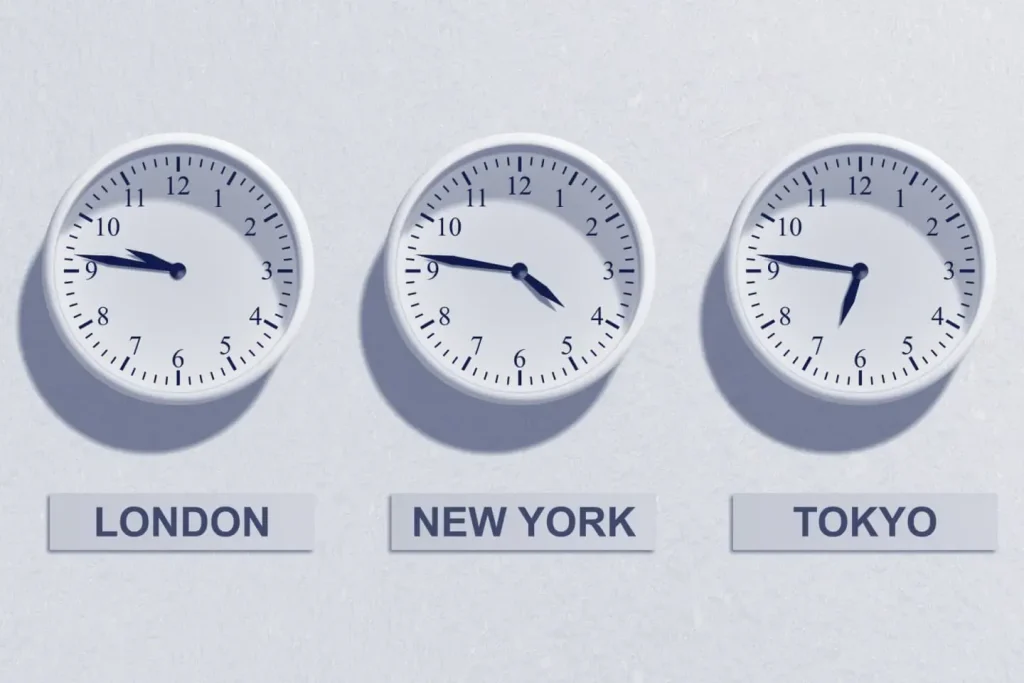What’s the Reason Behind FX Markets Being Closed During Weekends?

ទីផ្សាររូបិយប័ណ្ណអន្តរជាតិ គឺជាទីផ្សារហិរញ្ញវត្ថុដែលធំជាងគេបំផុត និងត្រូវបានចាត់ទុកថាជាទ្រព្យរាវបំផុតនៅលើពិភពលោក ហើយរូបិយប័ណ្ណនេះទៀតសោតត្រូវបានជួញដូរ ២៤ ម៉ោងក្នុងមួយថ្ងៃ ប្រាំថ្ងៃក្នុងមួយសប្តាហ៍។
ទោះជាយ៉ាងណាក៏ដោយទីផ្សារនេះមិនបើកដំណើរការនៅចុងសប្តាហ៍នោះទេ មានន័យថាមិនមានសកម្មភាពជួញដូរណាមួយនោះទេចាប់ពី ល្ងាចថ្ងៃសុក្ររហូតដល់ល្ងាចថ្ងៃអាទិត្យ។ តើមកពីមូលហេតុអ្វីទៅ?
តោះបើចង់ដឹងសូមមកតាមដានទាំងអស់គ្នា!🔔🔔
កត្តាម៉ាក្រូសេដ្ឋកិច្ច និងព្រឹត្តិការណ៍ភូមិសាស្ត្រនយោបាយ
ទីផ្សាររូបិយប័ណ្ណអន្តរជាតិទទួលឥទ្ធិពលពីម៉ាក្រូសេដ្ឋកិច្ច និងព្រឹត្តិការណ៍ភូមិសាស្ត្រនយោបាយ ដែលប៉ះពាល់ដល់ការផ្គត់ផ្គង់ និងតម្រូវការរូបិយប័ណ្ណអន្តរជាតិលើទីផ្សារ។ កត្តាទាំងនេះជាធម្មតាអវត្តមាន ឬមានតិចតួចបំផុតនៅចុងសប្តាហ៍ ដោយសារតែអាជីវកម្ម និងស្ថាប័នភាគច្រើនត្រូវបានបិទ ហើយសារព័ត៌មានភាគច្រើនមិនរាយការណ៍ពីព្រឹត្តិការណ៍សំខាន់ៗណាមួយកំឡុងពេលចុងសប្តាហ៍នោះឡើយ។
កត្តាមនុស្ស (Human Factor)
មូលហេតុចម្បងមួយដែលទីផ្សារ រូបិយប័ណ្ណអន្តរជាតិបិទនៅចុងសប្តាហ៍គឺដោយសារតែទីផ្សារត្រូវបានជំរុញដោយកត្តាមនុស្សពោលគឺអ្នកវិនិយោគត្រូវការពេលសម្រាកពីការទិញលក់នៅលើទីផ្សារ។ ការជួញដូរនៅក្នុងទីផ្សាររូបិយប័ណ្ណអន្តរជាតិអាចធ្វើឲ្យអ្នកវិនិយោគប្រឈមនឹងភាពតានតឹង ជាពិសេសសម្រាប់ពាណិជ្ជករដែលចូលរួមក្នុងការជួញដូរប្រេកង់ខ្ពស់ ឬប្រើយុទ្ធសាស្រ្ត និងសូចនាករស្មុគស្មាញច្រើន។ ដូច្នេះហើយពួកគាត់ត្រូវការពេលឈប់សម្រាកពីរាល់សកម្មភាពទិញលក់នៅពេលចុងសប្តាហ៍។
កត្តាបច្ចេកទេស
ហេតុផលទីបីដែលទីផ្សារ Forex បិទនៅចុងសប្តាហ៍គឺដើម្បីអនុញ្ញាតឱ្យមានតំហែទាំជាប្រចាំសម្រាប់ប្រព័ន្ធទិញលក់និង Platform ផ្សេងៗទៀត។ អ្នកវិនិយោគក្នុងទីផ្សាររូបិយប័ណ្ណអន្តរជាតិច្រើនប្រើបច្ចេកវិទ្យា និងកម្មវិធីទំនើបដើម្បីផ្តល់ឱ្យពាណិជ្ជករនូវលទ្ធភាពចូលទៅកាន់ទីផ្សារកាន់តែខ្ពស់។ Platform និងប្រព័ន្ធទាំងនេះទាមទារការថែទាំ និងការ Update ជាប្រចាំ ដើម្បីធានាថាវាអាចដំណើរការបានរលូន និងសុវត្ថិភាព។
|English Version|

The forex market is the largest and most liquid financial market in the world, where currencies are traded 24 hours a day, five days a week. However, the market is not open on weekends, which means that there is no trading activity from Friday evening to Sunday evening. Why is that?
Macroeconomic factors and geopolitical events
The forex market is influenced by macroeconomic factors and geopolitical events that affect the supply and demand of currencies. These factors are usually absent or minimal during the weekends, as most of the businesses and institutions are closed and most of the news outlets are not reporting any major events.
Human Factor
One of the main reasons why the forex market closes on weekends is because the market is driven by human beings, who need rest and leisure time. Trading in the forex market can be stressful and demanding, especially for traders who engage in high-frequency trading or use complex strategies and indicators.
Technical Factor
A third reason why the forex market closes on weekends is that it allows for routine maintenance and updates of trading platforms and systems. Forex brokers use sophisticated technology and software to provide traders with access to the forex market. These platforms and systems require regular maintenance and updates to ensure that they are running smoothly and securely.

